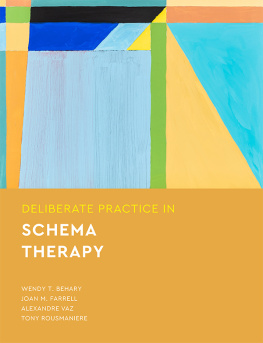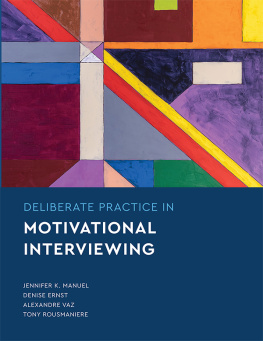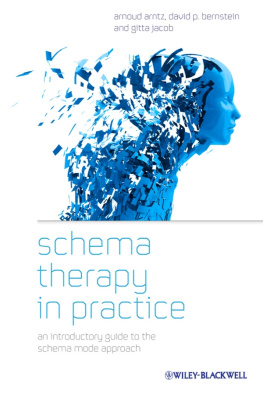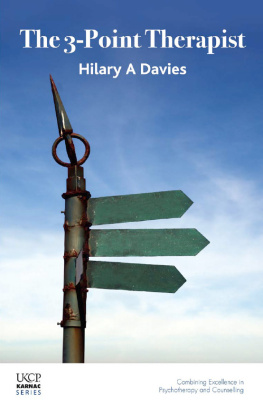Essentials of Deliberate Practice Series
Tony Rousmaniere and Alexandre Vaz, Series Editors
Deliberate Practice in Child and Adolescent Psychotherapy
Jordan Bate, Tracy A. Prout, Tony Rousmaniere, and Alexandre Vaz
Deliberate Practice in Cognitive Behavioral Therapy
James F. Boswell and Michael J. Constantino
Deliberate Practice in Dialectical Behavior Therapy
Tali Boritz, Shelley McMain, Alexandre Vaz, and Tony Rousmaniere
Deliberate Practice in Emotion-Focused Therapy
Rhonda N. Goldman, Alexandre Vaz, and Tony Rousmaniere
Deliberate Practice in Motivational Interviewing
Jennifer K. Manuel, Denise Ernst, Alexandre Vaz, and Tony Rousmaniere
Deliberate Practice in Schema Therapy
Wendy T. Behary, Joan M. Farrell, Alexandre Vaz, and Tony Rousmaniere
Deliberate Practice in Systemic Family Therapy
Adrian J. Blow, Ryan B. Seedall, Debra L. Miller, Tony Rousmaniere, and Alexandre Vaz
Copyright 2023 by the American Psychological Association. All rights reserved. Except as permitted under the United States Copyright Act of 1976, no part of this publication may be reproduced or distributed in any form or by any means, including, but not limited to, the process of scanning and digitization, or stored in a database or retrieval system, without the prior written permission of the publisher.
Electronic edition published 2023.
ISBN: 978-1-4338-3603-9 (electronic edition).
The opinions and statements published are the responsibility of the authors, and such opinions and statements do not necessarily represent the policies of the American Psychological Association.
Published by
American Psychological Association
750 First Street, NE
Washington, DC 20002
https://www.apa.org
Order Department
https://www.apa.org/pubs/books
In the U.K., Europe, Africa, and the Middle East, copies may be ordered from Eurospan
https://www.eurospanbookstore.com/apa
Cover Designer: Mark Karis
Library of Congress Cataloging-in-Publication Data
Names: Behary, Wendy T., author. | Farrell, Joan M., author. | Vaz, Alexandre, author. | Rousmaniere, Tony, author. | American Psychological Association.
Title: Deliberate practice in schema therapy / Wendy T. Behary, Joan M. Farrell, Alexandre Vaz, and Tony Rousmaniere.
Description: Washington, DC : American Psychological Association, 2023. | Series: Essentials of deliberate practice series | Includes bibliographical references.
Identifiers: LCCN 2022027881 (print) | LCCN 2022027882 (ebook) | ISBN 9781433836022 (paperback) | ISBN 9781433836039 (ebook)
Subjects: LCSH: Schemas (Psychology) | Schema-focused cognitive therapy.
Classification: LCC BF313 .B44 2023 (print) | LCC BF313 (ebook) | DDC 153--dc23/eng/20220824
LC record available at https://lccn.loc.gov/2022027881
LC ebook record available at https://lccn.loc.gov/2022027882
https://doi.org/10.1037/0000326-000
Series Preface Tony Rousmaniere and Alexandre Vaz |
We are pleased to introduce the Essentials of Deliberate Practice series of training books. We are developing this book series to address a specific need that we see in many psychology training programs. The issue can be illustrated by the training experiences of Mary, a hypothetical second-year graduate school trainee. Mary has learned a lot about mental health theory, research, and psychotherapy techniques. Mary is a dedicated student; she has read dozens of textbooks, has written excellent papers about psychotherapy, and receives near-perfect scores on her course exams. However, when Mary sits with her clients at her practicum site, she often has trouble performing the therapy skills that she can write and talk about so clearly. Furthermore, Mary has noticed herself getting anxious when her clients express strong reactions, such as getting very emotional, hopeless, or skeptical about therapy. Sometimes this anxiety is strong enough to make Mary freeze at key moments, limiting her ability to help those clients.
During her weekly individual and group supervision, Marys supervisor gives her advice informed by empirically supported therapies and common factor methods. The supervisor often supplements that advice by leading Mary through role-plays, recommending additional reading, or providing examples from her own work with clients. Mary, a dedicated supervisee who shares tapes of her sessions with her supervisor, is open about her challenges, carefully writes down her supervisors advice, and reads the suggested readings. However, when Mary sits back down with her clients, she often finds that her new knowledge seems to have flown out of her head, and she is unable to enact her supervisors advice. Mary finds this problem to be particularly acute with the clients who are emotionally evocative.
Marys supervisor, who has received formal training in supervision, uses supervisory best practices, including the use of video to review supervisees work. She would rate Marys overall competence level as consistent with expectations for a trainee at Marys developmental level. But even though Marys overall progress is positive, she experiences some recurring problems in her work. This is true even though the supervisor is confident that she and Mary have identified the changes that Mary should make in her work.
The problem with which Mary and her supervisor are wrestlingthe disconnect between her knowledge about psychotherapy and her ability to reliably perform psychotherapyis the focus of this book series. We started this series because most therapists experience this disconnect, to one degree or another, whether they are beginning trainees or highly experienced clinicians. In truth, we are all Mary.
To address this problem, we are focusing this series on the use of deliberate practice, a method of training specifically designed for improving reliable performance of complex skills in challenging work environments (Rousmaniere, 2016, 2019; Rousmaniere et al., 2017). Deliberate practice entails experiential, repeated training with a particular skill until it becomes automatic. In the context of psychotherapy, this involves two trainees role-playing as a client and a therapist, switching roles every so often, under the guidance of a supervisor. The trainee playing the therapist reacts to client statements, ranging in difficulty from beginner to intermediate to advanced, with improvised responses that reflect fundamental therapeutic skills.
To create these books, we approached leading trainers and researchers of major therapy models with these simple instructions: Identify 10 to 12 essential skills for your therapy model where trainees often experience a disconnect between cognitive knowledge and performance abilityin other words, skills that trainees could write a good paper about but often have challenges performing, especially with challenging clients. We then collaborated with the authors to create deliberate practice exercises specifically designed to improve reliable performance of these skills and overall responsive treatment (Hatcher, 2015; Stiles et al., 1998; Stiles & Horvath, 2017). Finally, we rigorously tested these exercises with trainees and trainers at multiple sites around the world and refined them based on extensive feedback.













